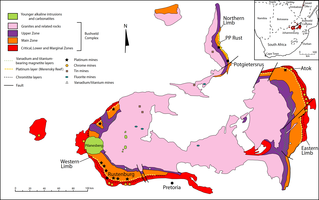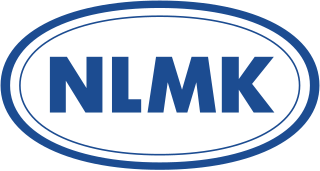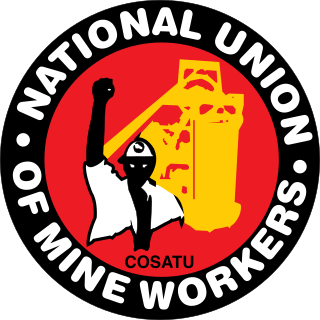Freeport-McMoRan Inc., often called Freeport, is an American mining company based in the Freeport-McMoRan Center, in Phoenix, Arizona. The company is the world's largest producer of molybdenum, a major copper producer and operates the world's largest gold mine, the Grasberg mine in Papua, Indonesia.

Agnico Eagle Mines Limited is a Canadian-based gold producer with operations in Canada, Finland, Australia and Mexico and exploration and development activities extending to the United States. Agnico Eagle has full exposure to higher gold prices consistent with its policy of no-forward gold sales. It has paid a cash dividend every year since 1983.
Anglo American plc is a British multinational mining company with headquarters in London, England. It is the world's largest producer of platinum, with around 40% of world output, as well as being a major producer of diamonds, copper, nickel, iron ore, polyhalite and steelmaking coal. The company has operations in Africa, Asia, Australia, Europe, North America and South America.
AngloGold Ashanti Limited is an independent and global gold mining company with a diverse high-quality portfolio of cooperation, projects and exploration activities formed in 2004 by the merger of AngloGold and the Ashanti Goldfields Corporation. As of 2022, it was a global gold producer with 21 operations on four continents, listed on the New York, Johannesburg, Accra, London and Australian stock exchanges, as well as the Paris and Brussels bourses, but left the Johannesburg exchange in 2023. As of May 2023, it was the world’s fourth-largest gold miner with assets in Ghana, Australia, the US and Argentina.

The Bushveld Igneous Complex (BIC) is the largest layered igneous intrusion within the Earth's crust. It has been tilted and eroded forming the outcrops around what appears to be the edge of a great geological basin: the Transvaal Basin. It is approximately two billion years old and is divided into four limbs: northern, eastern, southern and western. It comprises the Rustenburg Layered suite, the Lebowa Granites and the Rooiberg Felsics, that are overlain by the Karoo sediments. The site was first publicised around 1897 by Gustaaf Molengraaff who found the native South African tribes residing in and around the area.

Novolipetsk Steel, or NLMK, is one of the four largest steel companies in Russia. NLMK's share of domestic crude steel production is about 21%. It primarily produces flat steel products, semi-finished steel products and electrical steels. NLMK also produces specialty coated steels, plus high-ductility and micro-alloyed steels. It is the 21st-largest steel maker in the world. The larger NLMK group owns a number of other steel and mining industries, mostly in Russia.
Grupo México is a Mexican conglomerate that operates through the following divisions: Mining, Transportation, Infrastructure and Fundacion Grupo Mexico.
Petropavlovsk plc is a London-based gold mining company with operations in Russia. The company is listed on the London Stock Exchange.

The National Union of Mineworkers (NUM) is a mainly mining industry related trade union, an organisation of workers with common goals through organised labour, in South Africa. With a membership of 300,000 as of 2014, it is the largest affiliate of the Congress of South African Trade Unions (COSATU).

Mining in South Africa was once the main driving force behind the history and development of Africa's most advanced and richest economy. Large-scale and profitable mining started with the discovery of a diamond on the banks of the Orange River in 1867 by Erasmus Jacobs and the subsequent discovery of the Kimberley pipes a few years later. Gold rushes to Pilgrim's Rest and Barberton were precursors to the biggest discovery of all, the Main Reef/Main Reef Leader on Gerhardus Oosthuizen's farm Langlaagte, Portion C, in 1886, which kicked off the Witwatersrand Gold Rush and the subsequent rapid development of the gold field there.
Zijin Mining Group Co., Limited is a multi-national mining company headquartered in mainland China.
Kumba Iron Ore is an iron-ore mining company in South Africa. It is the fifth largest iron-ore producer in the world and the largest in Africa.

Impala Platinum Holdings Limited or Implats is a South African holding company that owns several companies which operate mines that produce platinum and platinum group metals, as well as nickel, copper and cobalt. Its most significant mine is the Impala mine in the North West province of South Africa. The company also owns or has interest in the Two Rivers mine and the Marula mine in the South Africa Bushveld Igneous Complex and the Mimosa mine and Zimplats in Zimbabwe, as well as the Impala Refining Services which smelts and refines metals for other companies. In December 2019, Impala Canada was formed, owned by the holding company, out of the acquisition of North American Palladium and its mine in Ontario, Canada.

The Marikana massacre was the killing of thirty-four miners by the South African Police Service (SAPS) on 16 August 2012 during a six-week wildcat strike at the Lonmin platinum mine at Marikana near Rustenburg in South Africa's North West province. The massacre constituted the most lethal use of force by South African security forces against civilians since the Soweto uprising in 1976 and has been compared to the 1960 Sharpeville massacre.

The Association of Mineworkers and Construction Union (AMCU) was formed in Mpumalanga, South Africa, in 1998 as a breakaway faction of the COSATU-affiliated National Union of Mineworkers (NUM). It was formally registered as a union in 2001. According to Mining Weekly, the union sees itself as distinct from NUM in that it is "apolitical and noncommunist".

The Workers and Socialist Party (WASP) is a Marxist and Trotskyist political party in South Africa affiliated to International Socialist Alternative.
On 15 November 2014 workers at South Africa's major platinum producers – Anglo American Platinum, Impala Platinum, and Lonmin – went on strike demanding that wages be immediately doubled. However, after five months of striking they settled for a more modest pay increase spread over three years. It was the longest and most expensive strike in South African history.
Northam Holdings is an independent integrated PGM producer listed on the JSE. The primary operations are centered on their three wholly owned mines, Zondereinde, Booysendal and Eland, and the additional metallurgical operations at Zondereinde including a smelter and base metals removal plant. Northam’s three main products mined are platinum, palladium and rhodium and are consumed by industries such as the motor manufacturing, jewellery and other industrial sectors.

Sibanye-Stillwater is a multinational mining and metals processing Group with a diverse portfolio of mining and processing operations and projects and investments across five continents. The Group is also one of the foremost global PGM auto catalytic recyclers and has interests in leading mine tailings retreatment operations.
Msokoli Frans Baleni is a South African businessman and former trade unionist who was general secretary of the National Union of Mineworkers between 2006 and 2015. Since 2007, he has been a member of the Central Committee of the South African Communist Party.










